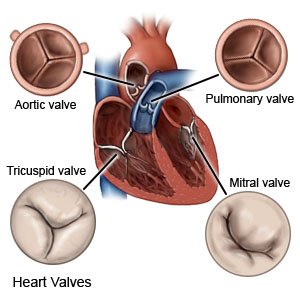Transcatheter Mitral Valve Repair
Medically reviewed by Drugs.com. Last updated on Aug 4, 2025.
What do I need to know about transcatheter mitral valve repair (TMVR)?
TMVR is a procedure to repair your mitral valve. The mitral valve normally opens and closes to let blood pass through the heart. If your mitral valve is damaged, blood may not flow as it should through your heart. TMVR is done if mitral valve replacement surgery is not safe for you. This procedure is also known as transcatheter edge-to-edge repair (TEER).
 |
How do I prepare for my procedure?
- Your healthcare provider will tell you how to prepare. You may be told not to eat or drink anything after midnight on the day of your procedure. Arrange to have someone drive you home when you are discharged.
- Tell your provider about all medicines you currently take. Your provider will tell you if you need to stop any medicine for the surgery, and when to stop. Your provider will tell you which medicines to take or not take on the day of the procedure.
- Tell your provider about any allergies you have, including to anesthesia or medicines.
- You may need an echocardiogram (echo) before surgery. An echo is a type of ultrasound that uses sound waves to show the structure and function of your heart. This will help your provider plan your repair.
What will happen during my procedure?
- You will be given general anesthesia to keep you asleep and free from pain. Your healthcare provider will make an incision in your upper leg. A catheter will be put into a vein in your leg and guided to the left side of your heart.
- A clip or other repair device will be guided through the catheter to your mitral valve. Your provider will use fluoroscopy (continuous x-rays) and ultrasound imaging to help guide the device. The clip or other repair device will be placed so that it holds the middle of the mitral leaflets (flaps). This will reduce the amount of blood that flows back into your atrium. Your provider will do tests to make sure the clip or other repair device is in proper position..
- The catheter will then be removed and the incision in your leg will be closed.
What should I expect after my procedure?
You will need to stay in the hospital for at least 1 day. Healthcare providers will monitor your heart functions.
What are the risks of a TMVR?
You may bleed more than expected. You may develop an infection. Damage to your vein or other blood vessels can occur. You may develop an abnormal or fast heartbeat. You may need medicine to correct your heartbeat. The clip or repair device may not reduce the back flow of blood enough. You may need different treatment.
Care Agreement
You have the right to help plan your care. Learn about your health condition and how it may be treated. Discuss treatment options with your healthcare providers to decide what care you want to receive. You always have the right to refuse treatment. The above information is an educational aid only. It is not intended as medical advice for individual conditions or treatments. Talk to your doctor, nurse or pharmacist before following any medical regimen to see if it is safe and effective for you.© Copyright Merative 2025 Information is for End User's use only and may not be sold, redistributed or otherwise used for commercial purposes.
Further information
Always consult your healthcare provider to ensure the information displayed on this page applies to your personal circumstances.
